#ideal society
Text
I wish being transgender wasn't a thing.
People just feel comfortable and okay in the body that we're born in.
Most people wouldn't get plastic surgery, unless it was for health reasons. No one would have to fit themselves into a mould they are told they have to contourt themselves into. People wouldn't feel uncomfortable in their bodies.
Society would reinforce that just existing is beautiful. Life is beautiful. We don't need to look a certain way in order to be worthy.
Worthy of what? It wouldn't be necessary to be worthy for specific values such as Love and Rights and Peace and Life; it would just be given. Would being "worthy" even matter? You wouldn't be worth "something" or worth "it" you would just be Worth. Women and men and all humans and everyone would just be Worth. Perhaps "Worthful" is accurate.
Women generally wouldn't feel the need to get "gender affirming care" such as breast implants. Society would let her just Be. Transgender people wouldn't feel like just because they have a period still, or lack of, then they are less than who they are "supposed" to be.
If people could just be people. Not in factions or groups. "Marginalized" people are just people. People who didn't get the life circumstances that they would always be considered "worthy."
And, because of this, everyone is afraid.
And everyone is deprived of a life of Worth.
#pride#relatable#transisbeautiful#trans community#transgender#genderfluid#gender nonconforming#nonbinary#radical views#ideal society#strawberry shortcake#strawberrylandistheidealsociety#i am delulu#delulu on purpose#infp#my political opinions#politics#polly pocket#polly pocket for president#polly pocket 2024
27 notes
·
View notes
Text
He depicts the Germans as primitive hunter gatherers with diets mostly consisting of meat and dairy products who only celebrate earthly gods such as the sun, fire, and the moon (6.21–22). German women reportedly wear small cloaks of deer hides and bathe in the river naked with their fellow men, yet their culture celebrates men who abstain from sex for as long as possible (6.21).
8 notes
·
View notes
Text
you know mafuyu was right if i had my own digital world that mimicked my true emotions and wants with hatsune miku there to give me therapy i would also lock myself in there for two weeks and have to be dragged out by force by my friends
20 notes
·
View notes
Text
"The Republic: Plato's Timeless Exploration of Justice, Politics, and the Philosopher's Quest"
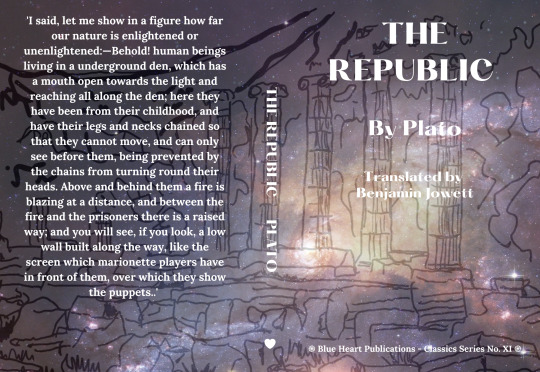
"The Republic," translated by Benjamin Jowett, stands as a timeless cornerstone in the philosophical canon, an intellectual odyssey that navigates the intricate landscapes of justice, politics, and the philosopher's pursuit of truth. Penned by Plato in the 4th century BCE, this Socratic dialogue remains a foundational work in political philosophy, ethics, and metaphysics. Jowett's translation, undertaken in the 19th century, preserves the essence of Plato's probing inquiries and dialectical brilliance, allowing readers to engage with the profound ideas that continue to shape the foundations of Western thought.
Plato's magnum opus unfolds as a series of dialogues, primarily led by Socrates, engaging with various interlocutors. The central exploration revolves around the question of justice, which becomes a metaphorical vessel for the examination of the ideal state, the role of individuals within society, and the nature of knowledge itself. The allegory of the cave, the tripartite division of the soul, and the philosopher-king are just a few facets of this multifaceted work that have reverberated through the corridors of academia for centuries.
The dialogue begins with an inquiry into the nature of justice as Socrates engages with characters like Thrasymachus, Glaucon, and Adeimantus. The discourse takes a dramatic turn as Plato introduces the allegory of the cave, an enduring metaphor for the journey from ignorance to enlightenment. This vivid imagery captures the transformative power of education and the philosopher's duty to ascend from the shadows of ignorance into the illuminating realm of true knowledge.
"The Republic" also ventures into the construction of an ideal state, led by philosopher-kings who possess both intellectual acumen and a commitment to the common good. Plato's vision challenges conventional notions of governance and explores the intricacies of a society governed by wisdom rather than mere political expediency. The dialogue delves into the organization of classes, the role of education, and the philosopher's ability to perceive the ultimate Form of the Good.
Benjamin Jowett's translation captures the nuances of Plato's intricate prose while maintaining accessibility for modern readers. His careful rendering of Socratic dialogues preserves the conversational tone and intellectual rigor that characterize the original work. Jowett's translation, though dated, remains widely used and respected, emphasizing the enduring appeal and significance of "The Republic" across generations.
"The Republic" is not merely an exploration of political theory; it is a profound meditation on the human condition. Plato's insights into the nature of knowledge, the complexities of justice, and the philosopher's role in society transcend the historical and cultural contexts in which they were conceived. The work prompts readers to question the foundations of their beliefs, to examine the societal structures they inhabit, and to consider the eternal pursuit of wisdom as a guiding principle.
In conclusion, "The Republic" by Plato, in Benjamin Jowett's translation, is a philosophical masterpiece that continues to shape the intellectual landscape. Its profound inquiries into justice, governance, and the nature of reality invite readers to embark on a philosophical journey that transcends time. The enduring relevance of Plato's ideas, coupled with Jowett's insightful translation, ensures that "The Republic" remains an indispensable text for anyone seeking a deeper understanding of the complexities of human existence and the perennial quest for a just society.
Plato's "The Republic" is available in Amazon in paperback 16.99$ and hardcover 24.99$ editions.
Number of pages: 471
Language: English
Rating: 10/10
Link of the book!
Review By: King's Cat
#Plato#The Republic#Socratic dialogue#Benjamin Jowett#Political philosophy#Ethics#Metaphysics#Ideal state#Justice#Knowledge#Allegory of the cave#Tripartite division of the soul#Philosopher-king#Thrasymachus#Glaucon#Adeimantus#Education#Allegory#Ideal society#Common good#Organization of classes#Form of the Good#Intellectual acumen#Political expediency#Conversational tone#Intellectual rigor#Human condition#Philosophical journey#Wisdom#Historical context
3 notes
·
View notes
Text
"The Republic: Plato's Timeless Exploration of Justice, Politics, and the Philosopher's Quest"
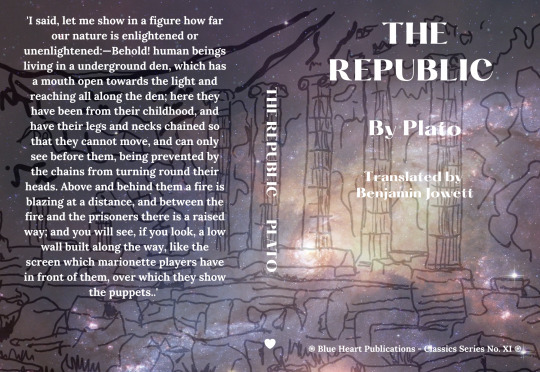
"The Republic," translated by Benjamin Jowett, stands as a timeless cornerstone in the philosophical canon, an intellectual odyssey that navigates the intricate landscapes of justice, politics, and the philosopher's pursuit of truth. Penned by Plato in the 4th century BCE, this Socratic dialogue remains a foundational work in political philosophy, ethics, and metaphysics. Jowett's translation, undertaken in the 19th century, preserves the essence of Plato's probing inquiries and dialectical brilliance, allowing readers to engage with the profound ideas that continue to shape the foundations of Western thought.
Plato's magnum opus unfolds as a series of dialogues, primarily led by Socrates, engaging with various interlocutors. The central exploration revolves around the question of justice, which becomes a metaphorical vessel for the examination of the ideal state, the role of individuals within society, and the nature of knowledge itself. The allegory of the cave, the tripartite division of the soul, and the philosopher-king are just a few facets of this multifaceted work that have reverberated through the corridors of academia for centuries.
The dialogue begins with an inquiry into the nature of justice as Socrates engages with characters like Thrasymachus, Glaucon, and Adeimantus. The discourse takes a dramatic turn as Plato introduces the allegory of the cave, an enduring metaphor for the journey from ignorance to enlightenment. This vivid imagery captures the transformative power of education and the philosopher's duty to ascend from the shadows of ignorance into the illuminating realm of true knowledge.
"The Republic" also ventures into the construction of an ideal state, led by philosopher-kings who possess both intellectual acumen and a commitment to the common good. Plato's vision challenges conventional notions of governance and explores the intricacies of a society governed by wisdom rather than mere political expediency. The dialogue delves into the organization of classes, the role of education, and the philosopher's ability to perceive the ultimate Form of the Good.
Benjamin Jowett's translation captures the nuances of Plato's intricate prose while maintaining accessibility for modern readers. His careful rendering of Socratic dialogues preserves the conversational tone and intellectual rigor that characterize the original work. Jowett's translation, though dated, remains widely used and respected, emphasizing the enduring appeal and significance of "The Republic" across generations.
"The Republic" is not merely an exploration of political theory; it is a profound meditation on the human condition. Plato's insights into the nature of knowledge, the complexities of justice, and the philosopher's role in society transcend the historical and cultural contexts in which they were conceived. The work prompts readers to question the foundations of their beliefs, to examine the societal structures they inhabit, and to consider the eternal pursuit of wisdom as a guiding principle.
In conclusion, "The Republic" by Plato, in Benjamin Jowett's translation, is a philosophical masterpiece that continues to shape the intellectual landscape. Its profound inquiries into justice, governance, and the nature of reality invite readers to embark on a philosophical journey that transcends time. The enduring relevance of Plato's ideas, coupled with Jowett's insightful translation, ensures that "The Republic" remains an indispensable text for anyone seeking a deeper understanding of the complexities of human existence and the perennial quest for a just society.
Plato's "The Republic" is available in Amazon in paperback 16.99$ and hardcover 24.99$ editions.
Number of pages: 471
Language: English
Rating: 10/10
Link of the book!
Review By: King's Cat
#Plato#The Republic#Socratic dialogue#Benjamin Jowett#Political philosophy#Ethics#Metaphysics#Ideal state#Justice#Knowledge#Allegory of the cave#Tripartite division of the soul#Philosopher-king#Thrasymachus#Glaucon#Adeimantus#Education#Allegory#Ideal society#Common good#Organization of classes#Form of the Good#Intellectual acumen#Political expediency#Conversational tone#Intellectual rigor#Human condition#Philosophical journey#Wisdom#Historical context
0 notes
Text
I think ideal society would be 2/3 fruit farmers and 1/3 people who get to lounge around and eat fruit all day but the thing is that you rotate every six months so that nobody is lounging about eating fruit without being aware of the work that went into it and nobody works on a fruit farm more than a year without getting to enjoy lounging for a while
0 notes
Text
Mizu was wrong to let Akemi be taken because they both deserve better
First, a confession. When I saw this for the first time:
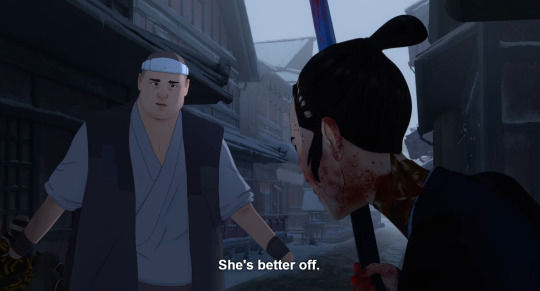
I was relieved. I knew that was what Mizu was going to say and I felt like it's what I would have said in that situation too.
When Akemi does this:
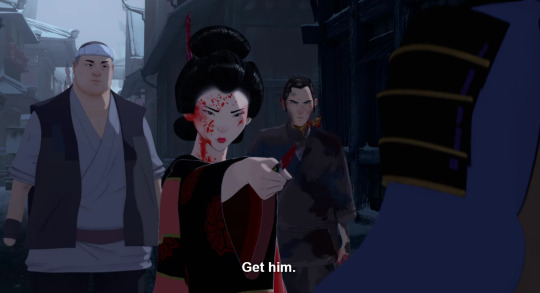
I cringed, because if we know anything about Mizu, it's that she (1) isn't quick to make friends (though to be fair, even though Akemi did try to kill Mizu, so did Taigen - multiple times! - and look how that turned out lol), and (2) doesn't take orders.
So when Akemi and Ringo and later Taigen get angry at Mizu, are they being unfair?
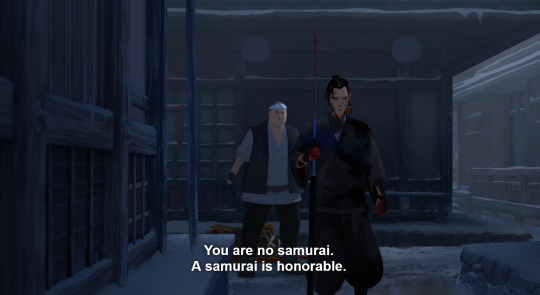
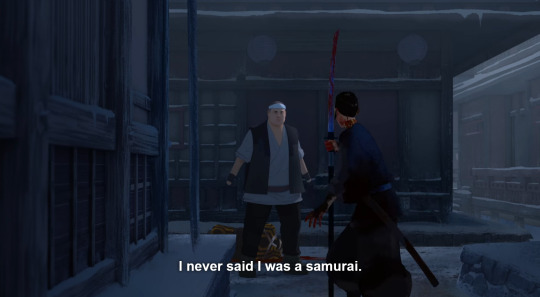

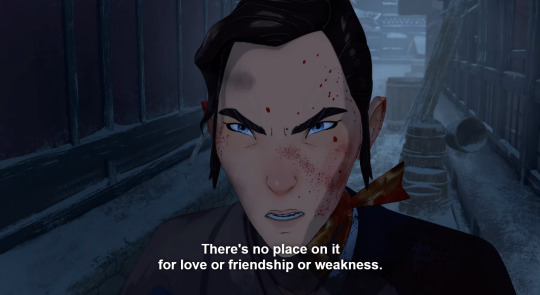
Sure, Mizu isn't obligated to treat Akemi - or Taigen or Ringo or anybody else - nicely, or to serve them, or to be honorable, or be a hero to them, or whatever. No human being is obligated to any other human being. We all have the choice to do whatever we want to anybody else. But the point of flawed characters in storytelling is the tension between those characters and their potential. Their growth into someone who can choose the higher, harder path, who chooses to be obligated to others, who chooses kindness and compassion.
Because Mizu's problem isn't revenge. Nobody is preaching at Mizu that revenge isn't the answer. Her circumstances do suck, her life has been incredibly unfair, she is marginalized, and as far as we and Mizu know for most of the season, she is a child born of violence and no one is saying that that violence doesn't deserve to be repaid in kind.
Mizu's problem is isolation. And the fact that she thinks she has no responsibility toward her fellow human beings, because her hatred of her own circumstances and her having no life outside of her quest devours everything else. This is a problem because it turns Mizu into the worst version of herself. A version that hurts the people who like Mizu, the people who care about her.
Practically, Mizu has just taken on an entire army almost by herself. She's hurt. She's exhausted. If she were to defend Akemi now, it'd be yet ANOTHER fight, this time against horsed and armored samurai.
But that's not the reason Mizu gives Ringo. Mizu's ability or willingness to fight isn't even on her mind. All she says is, "She's better off."
"She's better off" is Mizu deciding what's best for Akemi. Akemi's entire story is about her being a caged bird longing to fly free.

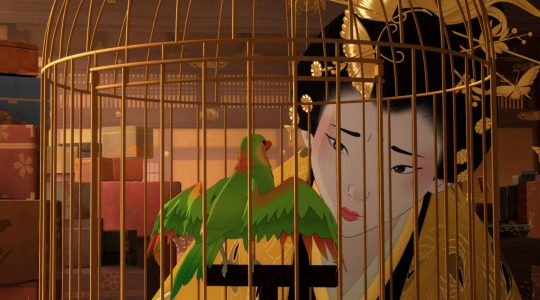
One after the other, every man and woman in Akemi's life makes her decisions for her. She has to grovel and smile prettily and lie through her teeth just for the chance to be heard. Mizu judges Akemi for being a rich princess who isn't being more grateful for what she has, all without understanding Akemi's situation, and without any curiosity for why Akemi feels the way she does. From Akemi's perspective, Mizu is just one more person (one more man!) in a long lineup who ignores Akemi's wishes and (casually!) makes a decision for her that impacts Akemi's life greatly.
In the end, even Seki concludes that Akemi should get to decide what's best for Akemi. What others think that Akemi SHOULD want does not matter compared to what Akemi wants for her own life. As Madame Kaji said - Madame Kaji, who despite calling out the weirdness of Akemi's situation as well as the childishness of her decision to run away - is the only person Akemi meets who doesn't try to make decisions for Akemi, but instead only challenges Akemi to work for and be worthy of what she wants - she needs to decide what she wants for her own fucking self, and then take it.
Mizu being born female does not make her automatically wiser for letting Akemi be taken, and it does not preclude her from having a hand in giving Akemi back to her jailers. A patriarchy that Mizu knows full well would stop Mizu from achieving her own goals if she didn't present as male.
Mizu is still understandable here. She just had to kill Kinuyo, a disabled girl sold by her father into prostitution, a girl in a situation so far beyond Akemi's worst imaginings that I can practically feel Mizu's world being rocked just by comparing them in her mind the way she most likely is. That still doesn't make it right for Mizu to let Akemi be carried off to be sold into marriage by her father against her wishes. Those "good options" Mizu thinks Akemi has don't exist, no more than they ever existed for Mizu. Akemi and Mizu both have to get creative, make the best of their circumstances, take dangerous risks, and break rules in order to have any control over their own lives.
Even on my first watch, when at first I thought that Mizu had made the right decision and that Akemi was being unreasonable, Akemi screaming Mizu's name while being dragged, LITERALLY DRAGGED, back to her father was haunting as hell.
Mizu had the power to help Akemi, and simply chose not to.
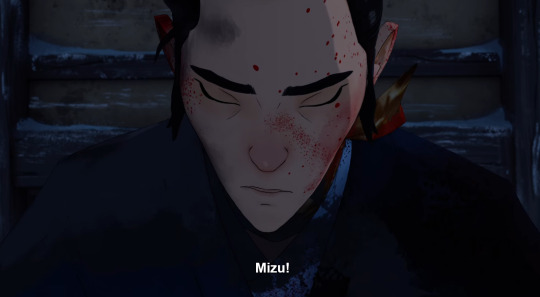
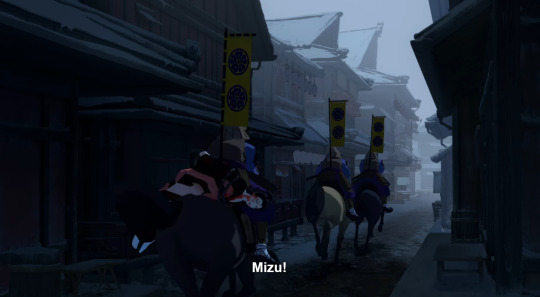
Mizu lets Akemi be taken, Akemi who has just begun to trust Mizu. Mizu calls Ringo weak and quickly - seemingly easily - turns her back on him. Mizu values her quest over Taigen's life, after Taigen has endured days of torture to protect her, and she not only risks his life in the process, but doesn't tell him that Akemi is engaged to someone else, or that she came looking for Taigen, or that she is in danger.
Mizu's sword breaks because it is too brittle. Too pure. Too singleminded. Mizu only melts down the meteorite metal when she mixes the metal with objects from parts of her life that have nothing to do with her quest. Objects from the people she cares about, and who care about her.
All I'm saying is - Mizu doesn't have to be a hero. But she is the better version of herself when she reaches out to help and connect with others. When she's just a decent, kinder human being. And I think that's what this story is telling us that we should want for Mizu.
#blue eye samurai#mizu#akemi#bes#I have so many more thoughts about Mizus tangential relationship to honor and heroism but that is for another post#also reviewing these scenes made me realize that when Mizu calls Ringo weak she LOOKS POINTEDLY AT HIS (LACK OF) HANDS#she legit calls him weak for his disability after EVERYTHING THEY'VE BEEN THROUGH#like Ringo was def disappointed that his master chose not to behave like the (nonexistent) samurai ideal#but what made him ANGRY was the weakness comment and I did not clock that before#also to be explored more in another post#a third thing to explore in another post is how both mizu and taigen have wronged akemi on the basis of Edo period society being A Society#though Mizu starts to correct her own mistake by going back for Akemi - its Taigen whos on thin ice lolol
736 notes
·
View notes
Photo
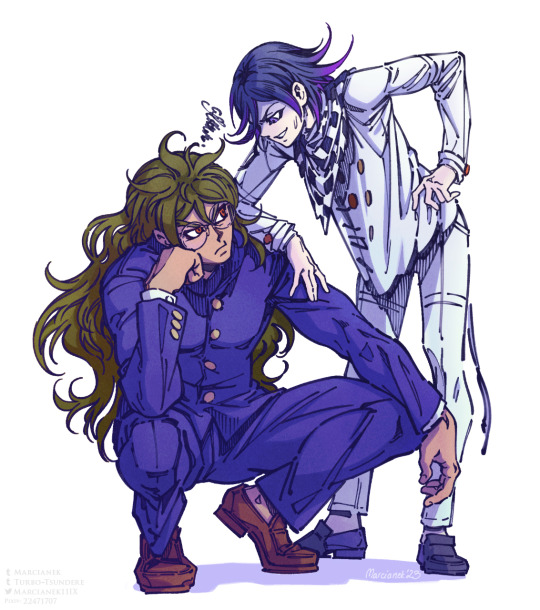
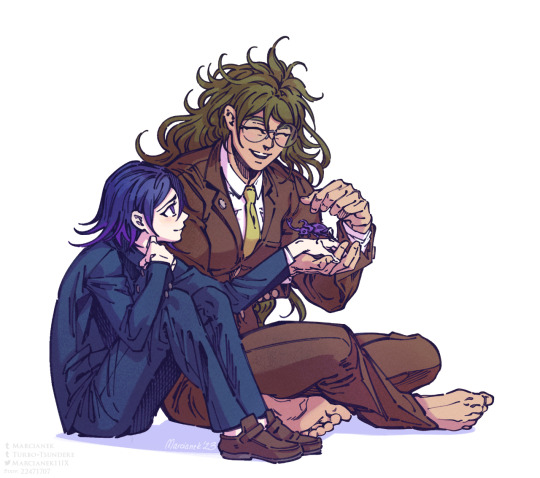
Let’s disturb da balance of the universe
#gonta gokuhara#gokuhara gonta#kokichi ouma#ouma kokichi#danganronpa#v3#ndrv3#pregame#ougoku#if you squint at the second pic#my art#tbh I don't really subscribe to the fanon that the pregame personalities are the exact opposities of ingame ones#(but then does anyone really?)#with v3 writing being overall more nuanced and usually going the 'yes but no but maybe except it's complicated' route#personally I like to imagine that even if they act differently at their core they aren't that different#and their in-game personalities are actually their repressed/subconsciouss true selves - or perhaps their ideal versions of themselves#that they couldn't reach due to being cynical/jaded and disillusioned with society#(nevermind what they wished for comes with its own set of grievances and pitfalls ;p)#that's just my impression given the audition tapes and what-not#BUT for the purpose of entertaiment let's imagine how much of an absolute menace the first combination would be XD#(whether it's a menace for Kokichi or they're a menace to everyone else is an entirely different matter ;p)#side note but drawing this made me realise and appreciate smth - Kokichi's gakuran is dark contrasting his in-game outfit#but Gonta also has his own contrast - the blue/indigo color historically associated with royalty#vs the brown of his in-game suit - color more associated with commoners and plainness but also symbolising being down to earth and friendly#that's really neat actually#esp considering he's from high-status family
1K notes
·
View notes
Text
the chalice of the gods becomes objectively funnier if you head canon that percy and annabeth only stay at New Rome for a single semester before realizing its batshit insane there and running for the hills
#maybe just maybe the society that idealizes a child military#while the fully grown adults are just chilling in a city#might just be a little screwy lmao#also I do think annabeth would lose it#I cant help but imagine everything would be casually anti-greek myth interpretation#or subtly /here is how we the Romans IMPROVED everything/#and annabeth would sit there seething in class idk#mine#new rome
618 notes
·
View notes
Text


#salandit#something-something female-dominated society which is why only the female ones can evolve#i think that is a little bit dumb. it's like. oh only the females can evolve bc the males are all malnourished and they give their food#to the females so only the females are capable of evolving but it's like ok. if a trainer catches a male salandit. it can be assumed that#they're gonna take better care of it than the wild would?? and like. ideally i believe that it would then become capable of evolution#bc its new trainer like. took care of it better. that's all i'm sayin i think male salandit should be able to evolve but maybe with like#different requirements or something. higher level requirement maybe#but naauuuurr tpc would never let us have a man that looks as slutty as salazzle does#even though we have primarina (thank you tpc) (thank you) (for the pretty boy capabilities) (also braixen) (thank you tpc) (do it again)
181 notes
·
View notes
Text
"Utopia Unveiled: Navigating Sir Francis Bacon's 'The New Atlantis' – A Prophetic Odyssey into Tomorrow's Science and Society"

Sir Francis Bacon's "The New Atlantis" is a thought-provoking utopian work that takes readers on a captivating journey to the mythical island of Bensalem. With a unique blend of scientific foresight, philosophical depth, and literary finesse, Bacon weaves a narrative that is as intellectually stimulating as it is imaginatively rich.
At the heart of this utopian tale is the House of Salomon, a scientific institution dedicated to the pursuit of knowledge and enlightenment. Bacon introduces readers to a society where science, reason, and progress reign supreme, creating a utopia that stands as a beacon of hope for a world in need of intellectual and moral rejuvenation.
One of the most striking aspects of "The New Atlantis" is Bacon's prophetic vision of scientific advancement. Published in 1627, Bacon's work predates the scientific revolution, yet it anticipates many of the technological marvels and scientific breakthroughs that would follow. His portrayal of Bensalem as a society embracing empirical inquiry and technological innovation is eerily prescient.
Bacon's narrative style is both engaging and instructive. The use of first-person narration adds a personal touch to the exploration of Bensalem, allowing readers to connect with the characters and their experiences. The vivid descriptions of the island, its inhabitants, and their way of life create a tapestry of utopian ideals that captivates the imagination.
"The New Atlantis" is not merely a work of fiction; it is a philosophical exploration of the relationship between knowledge, power, and societal progress. Bacon challenges readers to contemplate the ethical implications of scientific advancement and the responsibilities that come with wielding such knowledge.
While the narrative unfolds seamlessly, Bacon embeds profound philosophical reflections on topics ranging from the role of science in society to the moral responsibilities of the intellectual elite. His insights remain relevant, inviting readers to ponder the ethical dilemmas posed by the unbridled pursuit of knowledge.
In conclusion, "The New Atlantis" stands as a literary gem that transcends its time, offering readers a timeless exploration of utopian ideals and the complexities of scientific progress. Bacon's visionary work challenges us to reflect on the moral and ethical dimensions of our pursuit of knowledge, making it a must-read for anyone intrigued by the intersection of science, philosophy, and human nature.
Sir Francis Bacon's "The New Atlantis" is available in Amazon in paperback 10.99$ and hardcover 17.99$ editions.
Number of pages: 75
Language: English
Rating: 9/10
Link of the book!
Review By: King's Cat
#Utopian Literature#Scientific Utopia#Sir Francis Bacon#Philosophical Fiction#Renaissance Literature#Atlantis Allegory#Ideal Society#Scientific Progress#Knowledge and Wisdom#Experimental Science#Enlightenment Thought#Societal Harmony#Intellectual Exploration#Technological Advancements#Social Innovation#Island Nation#Moral Governance#Knowledge Societies#Interdisciplinary Wisdom#Ethical Progress#Intellectual Discovery#Utopian Vision#Cultural Enlightenment#Scientific Revolution#Future Societal Models#Empirical Knowledge#Human Progression#Philosophical Legacy#Societal Transformation#Renaissance Humanism
1 note
·
View note
Text
There are many bad things about wish, but one of the most annoying is how it fails to pay off its own set ups.
It's established Asha's father believes in the magic from the stars. He died of an illness (never specified), that Asha's grandfather (her father's father) never got his wish granted in YEARS, well now to me this feels targeted.
Follow my thoughts for a minute, how easy would have been with this already established set up to add the part where it's Magnifico who killed Asha's dad because he was promoting a different kind of magic that would undermine Magnifico's power? This would've established Magnifico as an actual villain from the start, manipulating people's perception of him with magic and the lengths he would go to keep his power and crown.
This would have impacted Asha's journey as well,instead of asking Magnifico to grant her grandfather's wish immediately (which imo is a good reason for him not to hire her, she literally asks for favoritism the moment she arrives), let her instead be perfect for the position, not clumsy and awkward but make her qualified and respectful of the king's secrecy about the wishes. And still she's still not hired. And then she starts questioning him, she's studied, she's ready and it's not enough and the king seemed to like her until she mentioned her father.
And then she talks with the people of rosa about the king, if that was unfair of him maybe , but the answer is that the king is good and kind and doesn't he grants everyone's wishes, isn't that so wonderful of him? (and maybe this can be a song) and at first it sounds like she just doesn't want to accept that she wasn't chosen but after the forth person answers the same exact thing, well then this starts to feel more like a script than an original thought. Just then she looks at all the wishes Magnifico's granted so far and they're all material, it's all about people owning bigger houses, better clothes, riches, nothing is about community, knowledge, about people becoming something(musicians, teachers, scientists, artists...) . The guy that got his wish granted last year also got it granted a few years ago too, Isn't that weird? Some people never get their wishes and this guy twice? And also his wish was so selfish? He wanted a swimming pool! How in the best kingdom, with the best king, nobody wishes nice things for others? And isn't that weird that she and her friends used to make graffitis and jokes on the guards but when Sleepy gave away his wish at 18 suddenly he doesn't make jokes about Magnifico's beard anymore? He's so respectful of the rules now.
And idk maybe Asha doesn't just wish upon a star and everything is given to her. Maybe Magnifico's source of magic is Star and she frees it and that's why Star tags along. The magic of the starts was real, her father was right! Star knew her dad, he tried to save the magical pet but he was killed instead! Now it's not just about freedom and justice she wants revenge. And this is maybe when she fucks up because she was too reckless, she got discovered. Her friends/family are watching how she's getting arrested/executed for treason and that's SO UNFAIR such a cognitive dissonance it breaks Magnifico's brainwash spell.
Now a song about revolution makes sense. But singing about revolution bc they want to be able to wish? Are you kidding me? Not only the movie established that you can have new wishes and that they make you whole again, but also girl, you all read the terms of services when giving Magnifico your wish. You give it to him and if he finds it worth it, it'll be granted. Making questions about the king choices is the opposite of living under a monarchy.
Ultimately I agree with everyone who says this movie feels empty, because it's true, it's a bunch of disney trope stitched together with easter eggs that don't makes us feel anything and that contradicts its own message. The fact that disney doesn't want to make grey characters anymore it's felt. And it mirrors the way people have started to see enjoying stories as media consumption, everything that alludes to people being flawed is an endorsement of abuse. So disney's characters have all turned is these empty shells of heroine tropes. They're always bubbly, their worst flaw is being clumsy, but the worst is that they're always right. Asha's quest to free the wishes is based only on her conviction that the king is wrong in not granting everyone's wish. It's never even hinted in the movie that the subjects of rosa lack something. It's a fairy-tale kingdom in every aspect (maybe the king is a bit egocentric but that hasn't hurt anyone so far), except that her grandpa's wish wasn't granted and so the king must be wrong. If it wasn't for Magnifico's long exposition of I don't accept criticism she wouldn't have questioned him. And even then, that's what living in a kingdom means, that you follow the king's rules. I'm sorry but singing about revolution and then ending the movie still under a monarchy is just contradictory with the whole premise.
#wish spoilers#disney wish#Wish 2023#Wish rewrite#Asha#Magnifico#Grey characters? Not in disney anymore#Where is the flynn Ryder type? Starts selfish becomes a better person#Elsa's self discovery? Anna growing out of idealized people#Moana tries to live on land to make her parents proud! It's only when her grandma gives her the heart that she leaves#Mulan disappoints her parents and leaves to save her dad#Not every plot has to involve the fate of a kingdom. Sometimes it can just be one person#Mulan pretending to be a man is still seen as a terrible thing by the society she lives she doesn't change everyone's mind just the people#She actually interacted with. Yeah and the emperor but she literally saved his life. He'd better be forgiving
157 notes
·
View notes
Text
"Utopia Unveiled: Navigating Sir Francis Bacon's 'The New Atlantis' – A Prophetic Odyssey into Tomorrow's Science and Society"

Sir Francis Bacon's "The New Atlantis" is a thought-provoking utopian work that takes readers on a captivating journey to the mythical island of Bensalem. With a unique blend of scientific foresight, philosophical depth, and literary finesse, Bacon weaves a narrative that is as intellectually stimulating as it is imaginatively rich.
At the heart of this utopian tale is the House of Salomon, a scientific institution dedicated to the pursuit of knowledge and enlightenment. Bacon introduces readers to a society where science, reason, and progress reign supreme, creating a utopia that stands as a beacon of hope for a world in need of intellectual and moral rejuvenation.
One of the most striking aspects of "The New Atlantis" is Bacon's prophetic vision of scientific advancement. Published in 1627, Bacon's work predates the scientific revolution, yet it anticipates many of the technological marvels and scientific breakthroughs that would follow. His portrayal of Bensalem as a society embracing empirical inquiry and technological innovation is eerily prescient.
Bacon's narrative style is both engaging and instructive. The use of first-person narration adds a personal touch to the exploration of Bensalem, allowing readers to connect with the characters and their experiences. The vivid descriptions of the island, its inhabitants, and their way of life create a tapestry of utopian ideals that captivates the imagination.
"The New Atlantis" is not merely a work of fiction; it is a philosophical exploration of the relationship between knowledge, power, and societal progress. Bacon challenges readers to contemplate the ethical implications of scientific advancement and the responsibilities that come with wielding such knowledge.
While the narrative unfolds seamlessly, Bacon embeds profound philosophical reflections on topics ranging from the role of science in society to the moral responsibilities of the intellectual elite. His insights remain relevant, inviting readers to ponder the ethical dilemmas posed by the unbridled pursuit of knowledge.
In conclusion, "The New Atlantis" stands as a literary gem that transcends its time, offering readers a timeless exploration of utopian ideals and the complexities of scientific progress. Bacon's visionary work challenges us to reflect on the moral and ethical dimensions of our pursuit of knowledge, making it a must-read for anyone intrigued by the intersection of science, philosophy, and human nature.
Sir Francis Bacon's "The New Atlantis" is available in Amazon in paperback 10.99$ and hardcover 17.99$ editions.
Number of pages: 75
Language: English
Rating: 9/10
Link of the book!
Review By: King's Cat
#Utopian Literature#Scientific Utopia#Sir Francis Bacon#Philosophical Fiction#Renaissance Literature#Atlantis Allegory#Ideal Society#Scientific Progress#Knowledge and Wisdom#Experimental Science#Enlightenment Thought#Societal Harmony#Intellectual Exploration#Technological Advancements#Social Innovation#Island Nation#Moral Governance#Knowledge Societies#Interdisciplinary Wisdom#Ethical Progress#Intellectual Discovery#Utopian Vision#Cultural Enlightenment#Scientific Revolution#Future Societal Models#Empirical Knowledge#Human Progression#Philosophical Legacy#Societal Transformation#Renaissance Humanism
0 notes
Text
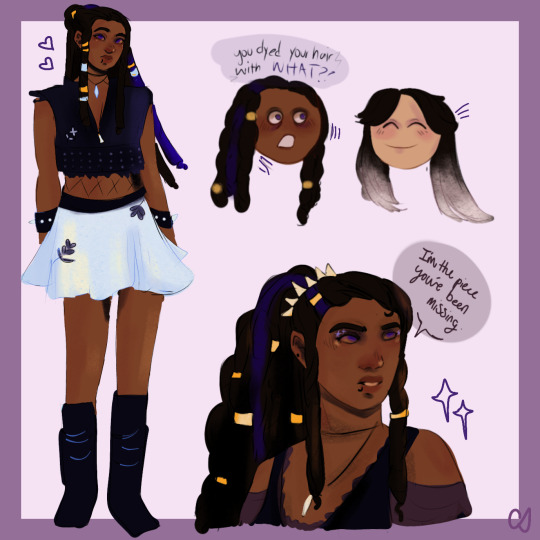
quick maruca drawings 💙
@skylilac @callas-pancake-tree @arson-anarchy-death @steal-nightmares-leave-dreams @neverseen-nevermore @abubble125 @purplesoup-lad-le @gay-otlc @thefoxysnake @keeper-of-the-lost-dadwin @ravs6709 @corruption-exe @kamikothe1and0nly @that-glasses-dog @presidentroarie @even-if-in-another-time @nyxpixels @slozhnos @katniss-elizabeth-chase @sofia-not-sophie @moontoastt @lemon-girl-in-devil-town @three-bunnies-in-a-trenchcoat @purpleunicycle @just-a-honey-badger @loverofallthingssmart @antisocialdork @tamsong @cutebisexualmess @tastetherainbow290 @gayupstraight @myfairkatiecat @famousinfamous @kale-of-the-forbidden-cities @oroshka @tw-5 @squishmallow36 @iggydancebreak @cosmxc-ars3hol3
#i tried to make marucas outfit vaguely punkish#i think the mention of her mom not liking the blue streak is interesting#especially combined with how kesler makes appearance changing elixirs short term and nasty#sort of implies that elf society doesnt favor appearance altering too much. specifically dyed hair.#maybe because theyre supposedly born perfect and so. any makeup or anything they use should be to help make them more perfect#their best selves or whatever. do you get it.#so just having fun with it and doing something silly isnt ideal#im not sure if im phrasing this right.#anyway. going against the elven norm equated her a bit with punk in my mind so we're going with it#kotlc#kotlc fanart#maruca chebota
62 notes
·
View notes
Text
the very common practice of girls and young women being married to adult/older men has imo played an underacknowledged role in reinforcing patriarchy. for one thing, if a girl is married off at 14, she has little opportunity to develop an identity or interests separate from her husband. secondly, it makes male domination within marriage seem "natural." a teenage girl with little to no education or experience of the outside world will naturally feel intellectually inferior to a 30 year old man, no matter how mediocre he may be. he can therefore control her more easily, and mold her to his tastes.
#i was thinking about this in the context of ancient greek/rome where marriage of teenage girls to men twice their age was considered ideal#but it's also applicable to contemporary societies#like in the US child marriage exists but is generally considered distasteful#but men are still typically a bit older than their female partners
74 notes
·
View notes
Note
would you ever consider drawing a1/2 gender swapped 🥺👉👈 for science reasons 🤓
yes but there is just so much to consider
#bc like#bc a2 would not be a 6’7’’ butch girl#she would be like a 5’3’’ high femme#and a1 would be like a 5’11’’ futch#bc like so much of their genders are actually build around the acceptance and or denial of their agab and their roles in society#a2 is trans in every universe#girl a2 would be just as unhappy in her body as boy a2 is#a2’s gender is not man or woman but the acceptance of their place in society bc they feel like its a waste of the Standard Ideal otherwise#and a1 is just a hot and perfect in every universe#a2 will always be uncomfortable and a1 will always mold the world to fit him#asks#a1/a2
54 notes
·
View notes